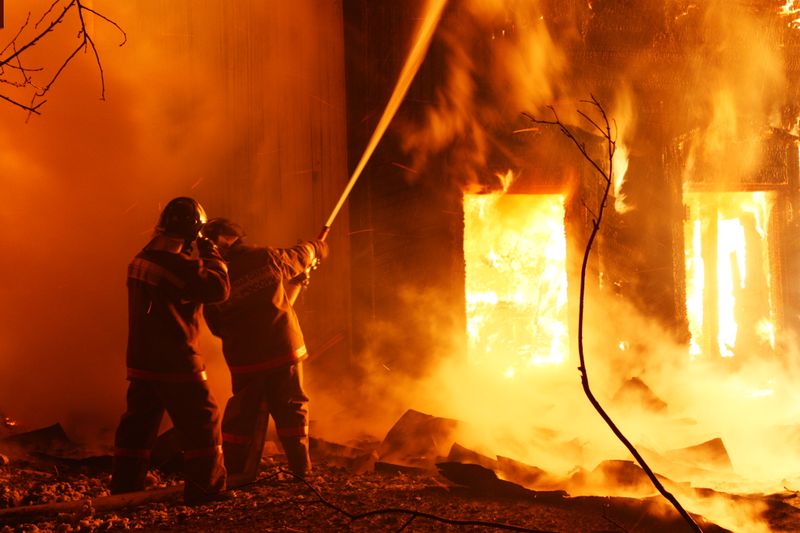Table of Contents
Greece is Burning: Understanding the Greek Fires Crisis
Introduction
The devastating fires engulfing Greece have not only grabbed international headlines but have also had a direct and profound impact on the country. With scorching temperatures reaching up to 46.4ºC, Greece’s forests have become vulnerable tinderboxes, prone to bursting into flames at the slightest spark. While there has been much speculation and accusations regarding the cause of these fires, the underlying issue they shed light on is the rising heat and the failure to adequately prepare for and contain such disasters. This article aims to explore the Greek fires crisis by providing five crucial insights, discussing the climate crisis, government policies, national forestry strategy, population movement, and the social solutions needed to address this issue.
A Worsening Fire Risk
The evolution and spread of wildfires are influenced by changes in landscapes that accumulate dry biomass, along with increased heat waves and prolonged droughts intensified by climate change. The fire risk season is expanding, with the number of extreme fire risk days doubling in the Mediterranean basin in the last 40 years. When combined with a lack of forest management and the growth of dry biomass due to human activity being abandoned, fires can spread uncontrollably, reaching urban areas and homes without mandatory prevention plans. This dangerous combination of factors has resulted in the chaos witnessed in Greece in recent weeks.
Prevention is Better than Cure
If wildfires are changing, the solutions must also evolve to avoid explosive firestorms that are impossible to extinguish. Pouring water into a large wildfire is futile if forests are not managed with adequate funding, investment, and tangible actions. The European Forest Fire Information System (EFFIS) data reveals a sharp increase in the area burned in Greece, with 42,900 hectares already burned in 2023 compared to previous years. Simply relying on more firefighting planes is not enough; a comprehensive approach to forest management and prevention is necessary to combat the escalating fire risks.
Five Crucial Insights
1. The Climate Crisis: The increasing danger, rapidity, and uncontrollability of wildfires can primarily be attributed to the climate crisis. Greece now finds itself in a hotter, drier, and more fire-prone territory, compounded by insufficient management and protection against such events. Wet seasons with high precipitation followed by prolonged drought periods have become particularly perilous. Rains promote plant growth, which subsequently dries out and increases the burnable biomass available to fuel and spread fires.
2. Government Policies: While climate change is a global issue, governments must also take responsibility for their actions. The Greek government, despite being aware of the detrimental effects of climate change, has failed to adequately mitigate its own contributions to the climate crisis. Instead, policies prioritizing short-term economic gains and over-subsidization of fossil fuels have worsened the situation, exacerbating the severity and frequency of extreme weather events.
3. National Forestry Strategy: Greece, being a forested and mountainous country, lacks an effective and enforced National Forestry Strategy. Decades of severe underfunding and a lack of proper management plans for wildfire prevention have led to the accumulation of significant amounts of dry biomass. Unmanaged forests and sparse shrubs create a continuous mass, increasing the flammability and promoting the spread of large forest fires.
4. Population Movement: Contrary to conventional belief, areas with little to no human presence are most vulnerable to fires. Revitalizing the rural environment and incentivizing people to settle in these areas can mitigate the effects of depopulation caused by economic opportunities concentrated in major cities. A mosaic agroforestry landscape, with activities linked to the primary sector, will create a more resilient environment against major forest fires, climate change, and biodiversity loss.
5. Social Solutions: Forest fires are not just ecological problems; they are social problems requiring social solutions. While urban development in high-risk areas must be prohibited, addressing inequality, insufficient access to resources, and livelihoods in struggling rural economies is crucial. An inclusive perspective on rural development, incorporating the needs and issues of rural communities, is essential in making the necessary investments and decisions.
Dousing the Flames
Regardless of the cause or source of each fire, monitoring every corner of the Greek mountains and forests is practically impossible. Establishing a well-organized and efficient forest fire extinction body equipped with necessary staff, support, and resources is crucial. However, without proper and effective forestry management and prevention measures, no extinction system can effectively control the magnitude of fires witnessed in recent years. The current distribution of resources in Greece primarily favors firefighting, rather than the recommended approach that emphasizes prevention.
Prevention plays a vital role in mitigating the impact of wildfires, facilitating their management, and extinguishing them when prevention measures prove insufficient. By collectively rethinking our relationship with ecosystems and taking proactive steps, we can strive for a more resilient and sustainable coexistence with nature while protecting our environment and communities.
Ignacio Navarro, a climate and energy campaigner with Greenpeace Greece, highlights the need for immediate action and investment to address the Greek fires crisis. His expertise in forest management engineering and Greenpeace’s advocacy for environmental protection makes him a reliable voice in this discussion.
Keywords: Extreme Weather, Fires, Greece, Climate Change, Government Policies, Forest Management, Rural Development, Prevention

<< photo by Vladimir Shipitsin >>
The image is for illustrative purposes only and does not depict the actual situation.
You might want to read !
- Combating Discrimination: Addressing the Spike in Religious Violence in India
- UAE’s Pledge for “Peaceful Assembly” at COP28 Masks Lack of Freedoms
- Injustice Behind Bars: The Imprisonment of a Saudi Psychiatrist
- Unleashing Destruction: Unraveling Russia’s Suspected Cluster Munition Attack in Ukraine
- Choosing Self-Sufficiency: A Sustainable Solution to Earth Overshoot Day
- Revamping the Economic System: Tackling Earth Overshoot Day with Innovative Solutions